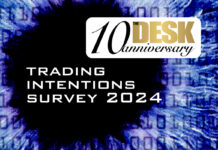Lynn Strongin Dodds asks whether the CFTC can get the bill passed before the election and what its impact will be if it does.
The clock is ticking for Regulation Automated Trading (Reg AT), as the US presidential election moves ever closer.
The Commodity Futures Trading Commission (CFTC) is two commissioners down and it is unclear whether the bill will be adopted before the big day. While some are hopeful time will run out, others believe it will see the light of day before the government changes hands.
As one industry participant notes, “People wish it won’t happen but I think Timothy Massad [chairman of the CFTC] will want to come up with up something before the election in November and I would not be surprised if Reg AT is passed in its original form despite the industry criticism.”
It will not be an easy sell though and the Commission which represents both political parties is shorthanded since Republican Scott O’Malia stepped down in 2014 followed by Mark Wetjen, a Democrat who often played the role of swing, who left in 2015. Both positions, which require full Senate approval, remain empty.
Dissent in every quarter
Market participants are in an uproar over the 521-page rule that is looking to improve transparency and tighten risk controls, registrations, and other safeguards around algorithmic order origination as well as electronic trade execution in US futures markets. The aim is to mitigate the risks of overdependence on technology and to avoid severe disruptions such as the Flash Crash in May 2010.
“This is an aggressive piece of work, particularly in the current US regulatory climate, which is well aligned with MiFID II and will make it more expensive to trade using algos and potentially squeeze the number of algos operating in the market,” says Dan Simpson, head of research at financial services regulation think tank JWG Group. “It is still too early to predict the effect; it will aim to reduce market volatility although it is not clear how big an impact it will have on liquidity.”
In the meantime, the 90-day consultation period which ran from 24 November 2015 generated a long list of complaints. The overall consensus was that the rules are too over-prescriptive and that several of the controls and safeguards have already been implemented. Many also baulked over the broad definition of algorithmic trading which seems to cover every financial institution ranging from existing players such as futures commissions merchants (FCMs), exchanges and swap dealers to the new faces of brokers, major swap participants and proprietary trading firms.
“The general feedback is that the regulation is way too complicated and the definition is not quite right because it is too onerous and captures everyone,” says Leslie Sutphen, founder of Financial Markets Consultants and co-chair the FIA’s Guide to the Development and Operation of Automated Trading Systems. “The rule would particularly hurt small firms who are proprietary traders but do not have a customer base and have not had to register before. It would create a large reporting, compliance and documentation burden.”
In addition, Sutphen notes that the measures proposed on self-matching, which aim to prevent the matching of orders for accounts that have common beneficial ownership or are under common control, will require a lot of work and will probably not uncover illegal or washed trades. “If you look at the FIA comment letter, exchanges already have tools in place to block these trades and less than 1% of self matches are illegitimate.”
However, the most controversial aspect of Reg AT is the requirement giving the government access to firms’ secret computer code or what many refer to as the ‘secret sauce’ without a subpoena. In its response to the consultation, financial investment giant Citadel echoed the sentiment of many when it said that the source code is often an investment firm’s most valuable intellectual property and critical to its overall commercial success and viability.
“Nearly every aspect of the investment process, from data analysis to strategy development to trade execution, can be deciphered from the source code employed to assist with these tasks,” wrote Adam Cooper, chief legal officer at Citadel, in his letter to the CFTC.
He argued that the Commission’s proposal altered the status quo in an “unprecedented manner without adequate justification and fails to thoroughly consider the associated risks and costs for market participants.” Other concerns he highlighted were accidental disclosure by Commission staff, security breaches due to cyberattacks, as well as a firm being left in a vulnerable position if its current investment portfolio, expected future trading activity or any other sensitive proprietary information were exposed.
In fact, as a recent report by Tom Lehrkinder, senior analyst at TABB Group, ‘Big Brother Is Watching: The Implications of CFTC Reg AT for the Futures Industry’ noted, this concern has precedent as there have been several ‘human’ breaches of data resulting for example in a potential leak of CME customer positions by a CFTC staff member. Moreover, there is no real precedent for any other business to be so open without a subpoena. There are questions to be answered about Department of Justice activity with the code and whether they are qualified to perform an intelligent review of the algorithmic processes.
The operational obstacles
Other challenges will be on the operational front, according to Simpson, “The impact will be the most significant on compliance and technology. For example, firms will need to implement tighter risk controls if they don’t have them, as well as developing sophisticated algo monitoring capabilities which do not generally exist today.”
According to research from JWG this includes segregating the development and production trading environments as well as implementing procedures for documenting the strategy and design of Automated or Algorithmic Trading Systems (ATS) software. Firms will also to develop continuous, real-time monitoring of ATS and the testing of all the codes prior to implementation. Technology, albeit an important part of the equation, will go only go so far because staff will also have to be appointed and hired to oversee the design, testing and monitoring,
“The CFTC wants to make sure that risk is not injected into the marketplace by rogue algos or firms that do not have the appropriate software, testing or IT process around putting algos into the system,” says Lehrkinder. “It is unclear though whether the rules will benefit the markets compared to the overall compliance costs incurred to implement the regulation.”
Lehrkinder believes that the CFTC is underestimating the burden Reg AT would place on firms and does not fully appreciate what the financial impact will be. Based on industry estimates for 100 firms, TABB expects the cost to the industry for initial implementation to be US$15 million and to surpass US$2 million annually for ongoing compliance, exceeding CFTC estimates.
The report expects that the Designated Contract Markets (DCMs) – boards of trade or exchanges – will pass along these added costs to their customers, while FCMs will do the same to their end users. Other trading firms will also be hit but have no one on the receiving end to help absorb the expense. The result is a drag on revenues which ultimately will impact profitability at any affected firm.
©TheDESK 2016




















